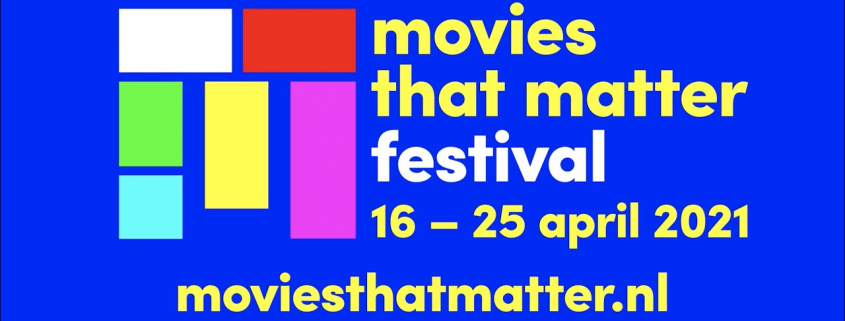Movies That Matter 2021 – Online
On Friday 16 April will start the 2021 edition of the Movies That Matter festival. This Hague-based international movies festival offers the audience around 70 films in six competitions programmes. The mission of the festival is to “open eyes for human rights”, through “screening of human rights related films and the stimulation of screenings of human-rights films”. “De Kracht van Cinema” (“The Power of Cinema”) is the festival’s moto. This is because Movies That Matter is more than a festival. It is a non-or profit organisation with far-reaching initiatives designed to create awareness, educate, and sitimulate conversations on human rights issues accross the world. By buying a ticket or making a donation, you can support their work. The movie festival taking place in March every year is the peak activity of the foundation.
This year however, the festival had to be postponed to mid-April. This is because, like a lot of the festivals around the globe, adjustments had to be made in light of the pandemic of Covid-19. In March 2020, the Movies that Matter festival was one of the first human rights movies festival to be entirely cancelled. There was simply not enough time to make adjustments to allow the screenings to take place online. Since last year, some of the events were moved online, allowing the organizers to learn valuable lessons for the organization of the festival online this year. With the hope to retain some of the planned events offline, two parallel festivals were first conceptualised. However, in light of the Dutch government’s announcements, the festival was moved entirely online.
At Creating Rights, we feel a special connection to the Movies That Matter festival taking place every year in the international city of peace and justice, The Hague, which is also our home. We individually and collectively attended screenings at the festival, discovered topics and heroes, contributed as chair to a panel, engaged in conversations with other members of the audience, wrote about all this experience, for example here and here. We joined in events such as the masterclasses, danced in concerts taking place before the screenings in one of the locations of the festival, the vibrant Theater aan het Spui, and we cried attending awarding ceremonies. It is therefore important for us to try to hear the struggles and efforts of this organisation in staying alive and active during the pandemic.
Discussions around the difficulties, but also the advantages, of holding human rights movie festivals online, have been ongoing as early as April 2020 when the editions that year were cancelled. On the Human Rights Films Network‘s website, you can learn about how those who struggled before the pandemie can continue forward despite the cancellation, or how the cancellation and moving online affect the people whose very lives are depicted in the movies.
There are reasons to feel sad about the digitalization of entire festivals. We will be not be able to sit with an audience when watching powerful movies on issues that are both terrible and so close to our humanity. We will not be able to see these people’s faces when leaving the cinema hall, and to talk about our expreriences together, including with strangers. This experience is irreplaceable. Communities that had only had access to these movies because of the efforts of organizations like Movies that Matter will not be able to see them without access to internet. Also, the screening of most of the movies are geographically blocked and can only viewed from the geographic area in The Netherlands. However, this is understandable, given the needs of struggling film directors to be able to be part of multiple festivals.
There are some advantages also. For example, the Camera Justitia competition, shedding “a light on people who take matters into their own hands”, showing movies with “underdogs who stand up against corruption, inequality and discrimination in their fight for justice”, offers a Masterclass which will be accessible worldwide. This year’s Masterclass, taking place on 22 April at 16:00 is free of charge but you need to register. It will honour the carreer of Judge Chile Eboe-Osuji, the former President of the International Criminal Court who ended his term in March 2021. As part of the Camera Justitia program, you can also register for the Global Justice Cinema Workshop, an online workshop taking place on April 22-23 on documentary film and global justice, co-organised by T.M.C. Asser Instituut, VU Amsterdam & the Movies that Matter Festival, especially designed for an audience with a special interets in law.
Finally, as we did in the past, here is a selection of movies that Creating Rights takes a special interest in because of their depiction of issues closely linked to the power of art in human rights struggles, such as the infringement upon freedom of expression:
- Scars, tells the story of Vetrichelvi, a female writer and poet – and a former Tamil Tiger, whose mission is to tell the stories of the many women and girls who fought for this militant group in the Sri Lankan civil war;
- Josep is an animated feature by French cartoonist Aurel, about Spanish illustrator Josep Bartolí, who fled the Franco regime into France in 1939;
- the Movies that Matter and Amnesty Masterclass will give on insight into the life of Nasrin Sotoudeh and the suppression by the authorities in Iran of the rights to freedom of expression.
There are a lot of interesting features, programmes, talks and competitions during the festival. The full program is here, and here is the list of workshops and masterclasses that will be accessible worldwide.
With special thanks to Dr Sofia Stolk of the Asser Instituut, Coordinator of the Camera Justitia program.



